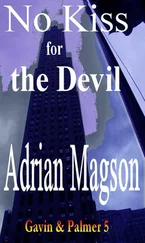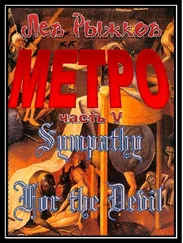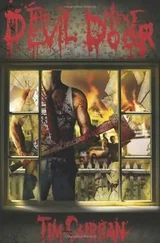“Why, Punky,” the Devil said softly, not without affection. “It’s you.”
“It sure is, pal. But they don’t call me Punky anymore.”
“Oh no?” The Devil absently licked a bit of stale egg from his forepaw.
“Nope. These days, people call me Mr. Wilkenfeld. Or better yet, the Eternal Lord of Darkness and Pain.”
“It’s like this, Pop,” Punky continued over Red Zinger tea in the breakfast room. “When you took off, you left a trillion hungry mouths to feed. Mouths with razor-sharp teeth. Mouths with multitudinously-forked tongues. Frankly, I didn’t know what to do, so I turned the whole kit-and-kaboodle over to the free-market-system and just let it ride. We went on the Dow in March, and by summer we’d bought out two of our closest rivals-Microsoft and ITT. I even hear Mr. Hot-Shot Heavenly Father’s been doing a little diversifying. Doesn’t matter to me, either. Whoever spends it, it’s all money.”
“It’s always good to see a former employee make good, Punky,” the Devil said graciously. “I mean, excuse me. Mr. Wilkenfeld.”
Punky finished his tea with a long, parched swallow. “Ahh,” he said, and hammered the mug down with a short, rude bang. “I guess I just wanted you to know that I haven’t forgotten you, Pops. In fact, I’ve even bought this little strip of beach you call home, and once we’ve finished erecting the new condos, we’ll move on to offshore oil rigs, docking facilities, maybe even a yachting club or two. Basically, Pop, I’m turning your life into scrap metal. Nothing to do with business, either. I just personally hate your guts.”
The Devil gradually grew aware of a dim beeping sound. With a sigh, Punky reached into his vest pocket and deactivated his digital phone with a brisk little flick.
“Probably my broker,” Punky said. “He calls at least six times a day.”
The Devil distantly regarded his former chargé d’affaires, whose soft pink lips were beaded with perspiration and bad faith. Poor Punky, the Devil thought. Some guys just never learn.
“And wanta know the best thing about this shoreline redevelopment project, Pop? There’s absolutely nothing you can do about it. You take it to the courts-I own them. You take it to the Board of Supervisors-I own them. You organize eight million sit-down demonstrations and I pave the whole damn lot of you over with bulldozers. That’s the real pleasure of dealing dirt to you born-again types, Pop. You gotta be good. But I don’t.”
The Devil watched Punky stand, brush himself off, and reach for his snakeskin briefcase. Then, as if seeking a balance to this hard, unaccommodating vision, he looked out his picture window at the hardware equipment littering his back yard. The Devil had been intending to install aluminum siding all week, and he hated to see unfulfilled projects rust away in the salty sea air.
“One second,” the Devil said. “I’ll be right back.”
“Sorry, Pop, but this is one CEO who believes in full-steam-ahead, toot toot! Keep in touch, guy. Unless, that is, I keep touch with you first-”
But of course before Punky reached the front door the Devil had already returned from his back yard with the shearing scissors. And Punky, who had belonged to the managerial classes for more eons than he cared to remember, was slow to recognize any instrument used in the performance of manual labor.
“Hey, Pop, that’s more like it,” Punky said slowly, the wrong sun dawning from the wrong hills. “I could use a little grooming if only to remind us both who’s boss. Here, see, at the edge of this cloven hoof? What does that look like to you? A hangnail?”
Punky had crouched down so low that it almost resembled submission.
At which point the Devil commenced to chop Punky Wilkenfeld into a million tiny bits.
“Seagulls don’t mind what they eat,” the Devil reflected later. He was standing at the end of a long wooden pier, watching white birds dive into the frothy red water. “Which is probably why they remind me so much of men.”
The Devil wondered idly if his life had a moral. If it did, he decided, it was probably this:
Just because people change their lives for the better doesn’t mean they’re stupid.
Then, remembering it was his turn to do bouillabaisse, the Devil turned his back on the glorious sunset and went home.
Faustfeathers A play by John Kessel
Cast of Characters:
Doctor John Faustus, professor of theology, University of Wittenberg
Wagner, his student and servant
Dicolini, a student at the university
Robin, another student
Frater Albergus, a spy for the Pope
Master Bateman, Albergus’s henchman
Helen of Troy, a spirit
Mephistopheles, a demon from hell
Martin, a porter
The Clock
students, demons, a barmaid
The entire play takes place in Wittenberg, Germany in late December 1519.
Scene 1: Faustus’s apartment, evening
Scene 2: Albergus’s room at the Boar’s Bollocks Inn, the next morning
Scene 3: Faustus’s classroom, late morning
Scene 4: Faustus’s apartment, afternoon
Scene 5: The tavern at the Boar’s Bollocks Inn, late afternoon
Scene 6: Faustus’s apartment, that evening
Scene 7: The tavern in the Boar’s Bollocks Inn, after midnight
ACT ONE
Scene One
Spotlight downstage center. Enter Mephistopheles.
Mephistopheles: Know, ladies and gentlemen, that I am Mephistopheles, chief among lieutenants to our great Master Lucifer. For twenty-four years now I have been bound by magical contract as servant to the necromancer Doctor Faustus. But now the end draws nigh.
As all demons, in compensation for our damnation I am given the power to be in every place, and the power to render myself invisible (renders himself invisible by draping his head and shoulders with tinsel). I see you when you’re sleeping, I see you when you wake,I know if you’ve been bad or good, so…
Excuse me. It is Christmas of 1519. All of Europe lies in turmoil over the heresies of Martin Luther. The Pope and the Roman Church attempt to keep repressed changes that cannot be repressed. To the West, a new world has been discovered. There is a rebirth of learning, a renewed quest for knowledge. It is an age of overreachers, where the certitudes of the Middle Ages have been challenged and in places, broken. New nations, new political movements, new commerce, new science, and old lusts. Vast opportunity for salesmen such as me.
Though you live some five centuries after the good doctor, you are bound as he by the self-same laws of the universe. There, but for the grace of God, go you.
Lights come up. We are in a medieval apartment, divided into three rooms. To stage right is a bedroom, center stage is a common room/dining room, and stage left is a library/laboratory/study. Of the furnishings of these rooms, the most bizarre is a human Clock that stands in the corner of the commons room: a man in a modern business suit who calls out the hours aloud.
The bedroom and laboratory are dark, but four men occupy the apartment. Wagner is looking for something in the study. At the dining table, lingering over the remains of a dinner, are Frater Albergus, Master Bateman, and Doctor Faustus. Albergus is an imposing man of middle years, wearing somewhat elaborate medieval garb. Bateman is Albergus’s henchman, a lascivious little man who has seen too much conniving and is cynically accustomed to it all. Wagner is Faustus’s student at the university of Wittenberg, and his servant. He is waiting table at this dinner. Faustus looks exactly like Groucho Marx of the early Paramount Marx Brothers films. He wears gold wire-rimmed spectacles, a black academic gown over a loose white shirt, a sloppily tied black cravat, and tights.
Читать дальше












